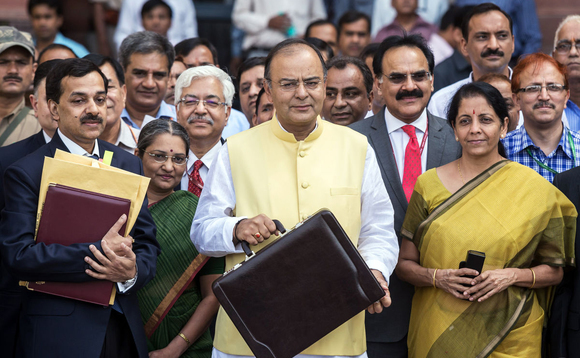
India's budget: Roadmap to recovery?

India’s recent Union Budget represents the opening salvo from a government that many in the business community hope will get the country moving again. The private equity industry is watching closely
When the results came in on May 12, for many it signaled a fresh start for India. The pro-business politician Nahendra Modi, leader of the Bharatiya Janata Party, swept to power with an overwhelming majority in the largest democratic election the world has ever seen.
With India having suffered two years of anemic growth, a falling rupee and a persistently high current account deficit and an ineffective government, it is little wonder Modi is treated as something of a second coming. Keen to live up to the perception, he has coined the catchphrase, "The good days are about to come."
After a six-week honeymoon period, Modi's administration faced its first biggest test - the Union Budget. Presented by Minister of Finance Arun Jaitley on July 10, it was primed as a statement of intent and an indication of how the government plans to meet the expectations of its supporters. Once Jaitley sat down, the public markets jumped up - and the significant rebound was seen as evidence that the budget is investor-friendly.
Whether the document can more specifically be described as private equity-friendly, however, rests on a few key issues.
"Given the government only had 45 days to present the budget, I see it more as a statement of intent" says Munish Dayal, a partner with Baring Private Equity Partners India. "And it has clearly spelt out the intentions of the new government."
Liberalization agenda
Most of the goals involve broader macroeconomic targets such as tackling the deficit by reducing subsidies and encouraging growth through infrastructure investment. For private equity, the most positive development is liberalization of foreign direct investment (FDI) in certain sectors. The budget outlines a substantial increase in the FDI limit - from 26% to 49% - across the defense and insurance sectors.
This is particularly significant for the insurance sector, which struggled to consolidate due to a lack of investment; AVCJ Research data shows that in the past five years there have been just five PE investments in this space totaling $150 million.
"Insurance is a nascent sector, barely seven or eight years old," says Vikram Utamsingh, co-head of Alvarez & Marsal (A&M) India and managing director of the firm's transaction advisory group. "But if you look at the penetration and the product available, it is really in its first life cycle so it is great sector to invest in for the long term."
Another sector likely to benefit from this budget is manufacturing. Under new proposals, mid-cap manufacturing firms that invest more than INR250 million in new plants and machinery over a 12-month period will qualify for a 15% government rebate. This was previously only available to larger companies.
The budget also includes significant changes that will lead to the recognition of the Real Estate Investment Trusts (REITS) and Infrastructure Investment Trusts (InvITs) in India. Jaitley confirmed the structures would have pass-through status - which means they are not liable for corporate tax - as well as receiving other "necessary incentives." The move is intended to create a single layer of tax for the structures, addressing investors' concerns that they might be taxed at multiple points.
Coming on the back of new guidelines for REITs issued last October, it is hoped that a new liquidity channel for investors - spinning completed properties into listed trusts that generate consistent yields through rental income - is about to open up.
Dayal cites one of Baring's portfolio companies, real estate developer RMZ Corp, as a potential beneficiary. "RMZ has a large portfolio of leased commercial real estate which it is in the process of doubling in size," he says. "The company will benefit from using a REIT structure as this will facilitate the listing of this asset when the time comes to exit."
Taxing issues
Investors are less positive about broader taxation policies, where greater clarity is required. "While the government did express a commitment to resolving large-scale bottle necks, such as taxation, it did not outline specific policies on these issues," says Roopa Purushothaman, managing director at Everstone Capital.
Retrospective taxation has been a contentious issue ever since the government sought to impose capital gains tax on Vodafone's acquisition of Hutchison Essar - an offshore transaction involving onshore assets - after the transaction closed in 2007. The government has now said it will not bring new retrospective litigation against companies, but this has not put the issue to bed.
"For existing cases involving retrospective taxation, the government is saying that continuing with the current litigation is the best was to resolve the issue," says Sangeev Aggarwal, co-founder of Helion Venture Partners. "So there is relief for some investors but others have been left hanging."
One of the more worrying developments for GPs - particularly in the context of exits - is new rules concerning long-term capital gains tax. Under the previous regime, holding either a listed or unlisted security for period of more than 12 months meant that it qualified for long-term capital gains tax of 20%. But new legislation states that unlisted securities will only receive long-term treatment after a minimum three years. An exit within this period would trigger a short-term capital gains tax of 40%.
"It is pretty crippling, actually," says A&M's Utamsingh. "We have seen some PE transactions where a GP has invested in a company and there has been a strategic player from overseas who offers a valuation that allows a PE firm to make a 3x return after two years. If that happened today, the GP would find it very difficult to do that transaction."
Clearly there is room for improvement, with some hoped for changes yet to come to fruition, but the mood is one of cautious optimism. Utamsingh tempers his disappointment with the remark that it is still early days for the Modi administration.
Helion's Aggarwal, meanwhile, is looking for reform to bring with it a clearer grasp of the asset class among bureaucrats. "My sense is that the government is trying to better understand the needs of our industry and more clarity will come with time," he says. "We can see they are intent on engaging with the industry."
Baring's Dayal also endorses this wait-and-see approach. He stresses that while the details of the budget are important, the overall message is that the new government is pro-business, which can only be good for private equity on a broad level. "I think this budget will start a growth cycle in India which will see capital expenditure increase, offering opportunities in manufacturing, real estate, infrastructure and financial services," says Dayal. "All of these will revive the growth cycle and facilitate overall consumption."
SIDEBAR: Start-ups - Fresh impetus
For venture capital investors, the stand-out number in India's 2014 Union Budget is the INR100 billion ($1.6 billion) that the government has earmarked for a fund-of-funds intended to boost entrepreneurship and nurture start-ups. There is no information on allocation policy, but the fund will provide risk capital to young companies through a mixture of equity, mezzanine capital and soft loans.
"The details are not there yet but I think it is important the government has acknowledged that supporting start-ups is key to job creation and that they are willing," says Mohan Kumar, executive director with Norwest Venture Partners in India.
This willingness to support the country's venture ecosystem is reflected in a number of other initiatives within the budget. They includes plans to establish a technology center to promote innovation, entrepreneurship and agro-industry accompanied by a fund with a corpus of INR2 billion. The government also said it would to put aside other smaller pools of capital for early-stage investment, including INR1 billion for a "Start Up Village Entrepreneurship Program" targeting rural youths.
In addition, Finance Minister Arun Jaitley proposed appointing a committee of representatives from the Finance Ministry, the Ministry of Micro, Small and Medium Enterprises (MSMEs) and the Reserve Bank of India (RBI) to make recommendations on how the small businesses can be better financed. As part of this, Jaitley wants to review the official definition of MSME to provide a higher capital ceiling, which would give companies easier access to credit.
A number of industry participants believe that sustaining investment in domestic start-ups depends on unlocking new pool of capital - notably high net-worth individuals (HNWIs). Indian angel fund Your Nest recently recommended that measures be taken to encourage HNWIs, who typically focus on assets like real estate, gold and fixed income, to act as angel investors and put more capital towards venture capital and private equity. However, not all agree that this is a matter of policy change.
"Unlocking capital from HNWIs will be more a function of change in sentiment and the macroeconomics," says Sanjeev Aggarwal, co-founder of Helion Venture Partners. "Better sentiment drives more capital and vice-versa, and we are beginning to see signs of that cycle."
Latest News
Asian GPs slow implementation of ESG policies - survey
Asia-based private equity firms are assigning more dedicated resources to environment, social, and governance (ESG) programmes, but policy changes have slowed in the past 12 months, in part due to concerns raised internally and by LPs, according to a...
Singapore fintech start-up LXA gets $10m seed round
New Enterprise Associates (NEA) has led a USD 10m seed round for Singapore’s LXA, a financial technology start-up launched by a former Asia senior executive at The Blackstone Group.
India's InCred announces $60m round, claims unicorn status
Indian non-bank lender InCred Financial Services said it has received INR 5bn (USD 60m) at a valuation of at least USD 1bn from unnamed investors including “a global private equity fund.”
Insight leads $50m round for Australia's Roller
Insight Partners has led a USD 50m round for Australia’s Roller, a venue management software provider specializing in family fun parks.






